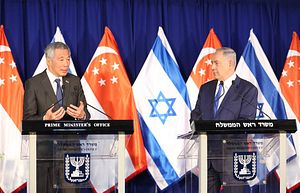Earlier this month, Singapore’s Prime Minister Lee Hsien Loong made his inaugural visit to Israel as part of a week-long Middle East working trip that also took him to Jordan. The trip underscored the mature relationship between Israel and Singapore, one founded on deep history as well as strong elite ties shaped by a shared historical narrative of geopolitical survival and the desire to prosper against the odds.
In part due sensitivities about how such a visit might be seen by Singapore’s larger, Muslim-majority neighbors, a visit by a Singaporean leader has never taken place despite the extremely close security cooperation between both countries. The visit is the first by a Singaporean Prime Minister since diplomatic ties were established between both countries in 1969.
Israeli Prime Minister Benjamin Netanyahu, who on April 19 received Lee along with an approximately 60-person delegation including Foreign Minister Vivian Balakrishnan, termed the visit “historic” and said that it reflected a “coming-of-age” in bilateral relations. Netanyahu emphasized how both countries had overcome sizable odds and built dynamic and prosperous economies – Singapore from a micro-state with few natural resources and Israel from military threats to its very existence, thus allowing both states to “punch well above our (their) weight” in the international sphere. Netanyahu also expressed his admiration for Singapore’s late founding father Lee Kuan Yew, who he described as a “great statesman of the 20th century.”
In a speech at Hebrew University where he received an honorary doctorate, Lee expressed gratitude for the helping hand that the Israelis extended in the early days of Singapore’s independence. Israel helped the city-state, which was booted out of Malaya in 1965, boost its military infrastructure and set up its internal security ministries when other countries turned Singapore down. Trust between both states was established at the onset of Singapore’s post-independence history. Since then, the security relationship has blossomed along the twin lines of a path-dependent familiarity and an overlap of strategic interests. Singapore is considered one of the biggest customers for Israeli arms and weapon systems.
Lee also met with Israeli President Reuven Rivlin and leader of the Israeli opposition Isaac Herzog. Meeting Prime Minister of the Palestinian National Authority Rami Hamdallah in Ramallah separately, Lee urged a resumption of negotiations on a two-state solution and doubled an aid package to the Palestinian Territories.
Lee’s inaugural visit to Israel was peppered with a range of outcomes fitting for a historic and inaugural visit. Singapore’s National Research Foundation and Israel’s Hebrew University concluded a research tie-up which will see a research and innovation center set up in Singapore. Research collaboration deals were also signed between Hebrew University and the National University of Singapore and Nanyang Technological University.
Such linkages are an enlargement of existing cooperation in R&D. The Singapore-Israel Industrial Research & Development Foundation has provided $170 million in funding for about 150 projects since 1997. Both countries signed an MOU to jointly provide training in economic development, innovation, health and sustainable development to developing country professionals. This can be interpreted as a soft power boost for both states and is also a way of achieving greater name-recognition for their respective models, in addition to the benefits of increasing the scope of mutual cooperation.
Lee was keen to tap on Israel’s “technical prowess and ecosystem,” particularly in the realm of cyber-security (I have previously written about the city-state’s recent push for an upgrade of its infrastructure and capabilities). Both Israel and Singapore have seen joint partnerships in technology venture funds and Singapore is actively encouraging its water technology companies to bid competitively in a Red Sea-Dead Sea canal project up for tender.
People-to-people ties were also another area of focus, even though this dimension has never really loomed that large in the context of the broader relationship. Singapore is home to a tiny orthodox Jewish community numbering approximately 1,500, consisting of mostly professionals often relocated for short periods of time for business or government work. Conversely, the Singaporean community in Israel is not large.
Historical parallels between Israel and Singapore as small states in a decidedly anarchic self-help regional system – which by the way partly explains their close reliance on the United States as a security guarantor – is a story of strange bedfellows and “fearless friendship.” But it is also a relationship that was uniquely shared among the older generation of leaders, with limited resonance among the young post-Cold War generation. Appropriated for the purposes of diplomacy and politics, the parallels quickly break down when pushed too far. For one, national identity is constructed and occasionally contested, especially in the case of a post-colonial state like Singapore. The Singapore nation came after the state. The Jewish nation, on the other hand, traces back to 5,000 years of Jewish history that long preceded the Jewish state. Israel has the Torah, Talmud and cultural practices unique to the Jewish people. In Singapore, the equivalent is a colonial inheritance of institutions alongside a patchwork of immigrant ethno-religious practices mixed in a melting pot.

































